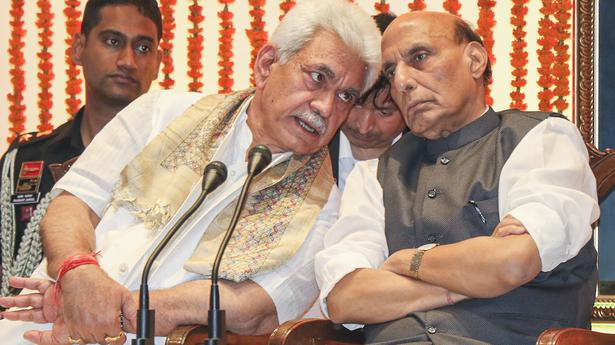
Won’t allow migration of minorities from J&K, says Rajnath Singh
The Hindu
Targeted killings due to foreign conspiracy, Defence Minister says, hints at Assembly election later in the year
Union Defence Minister Rajnath Singh, who concluded his two-day visit of Jammu and Kashmir on Friday, said no forcible migration of minorities would be allowed anymore and hinted at Assembly election later this year in the Union Territory.
“We have witnessed a migration of minorities in the past. Whether Hindus or Christians, such forcible migration won’t be allowed at any cost now,” Mr. Singh, who was speaking at a function in Jammu to commemorate the 200th year of the coronation of Dogra ruler Maharaja Gulab Singh, said.
Mr. Singh blamed Pakistan for the recent targeted killings in Kashmir, which have left nine persons dead, including members of the minority communities and non-locals.
“Our neighbour is playing a crucial role in sowing the seed of hatred here. From the tribal raid of 1947-48 to the recent targeted killings, these are all foreign conspiracies. We need to defeat this conspiracy. The future of J&K has to be shaped by its people. The neighbouring country cannot digest the fact that India is rising,” Mr. Singh said.
Without mentioning any role of Muslim leaders in J&K, Mr. Singh said, “The rulers from Ranjit Singh to Gulab Singh and Prem Nath Dogra worked for the unity of people in J&K. They are the role models under whom Hindus, Muslims and Buddhists worked together.”
The Defence Minister appealed to people of J&K “to maintain the social fabric and think above the religious lines”.
“There are forces who are trying to damage the fabric and make efforts to radicalise locals,” Mr. Singh said.

“Writing, in general, is a very solitary process,” says Yauvanika Chopra, Associate Director at The New India Foundation (NIF), which, earlier this year, announced the 12th edition of its NIF Book Fellowships for research and scholarship about Indian history after Independence. While authors, in general, are built for it, it can still get very lonely, says Chopra, pointing out that the fellowship’s community support is as valuable as the monetary benefits it offers. “There is a solid community of NIF fellows, trustees, language experts, jury members, all of whom are incredibly competent,” she says. “They really help make authors feel supported from manuscript to publication, so you never feel like you’re struggling through isolation.”

Several principals of government and private schools in Delhi on Tuesday said the Directorate of Education (DoE) circular from a day earlier, directing schools to conduct classes in ‘hybrid’ mode, had caused confusion regarding day-to-day operations as they did not know how many students would return to school from Wednesday and how would teachers instruct in two modes — online and in person — at once. The DoE circular on Monday had also stated that the option to “exercise online mode of education, wherever available, shall vest with the students and their guardians”. Several schoolteachers also expressed confusion regarding the DoE order. A government schoolteacher said he was unsure of how to cope with the resumption of physical classes, given that the order directing government offices to ensure that 50% of the employees work from home is still in place. On Monday, the Commission for Air Quality Management in the National Capital Region and Adjoining Areas (CAQM) had, on the orders of the Supreme Court, directed schools in Delhi-NCR to shift classes to the hybrid mode, following which the DoE had issued the circular. The court had urged the Centre’s pollution watchdog to consider restarting physical classes due to many students missing out on the mid-day meals and lacking the necessary means to attend classes online. The CAQM had, on November 20, asked schools in Delhi-NCR to shift to the online mode of teaching.









